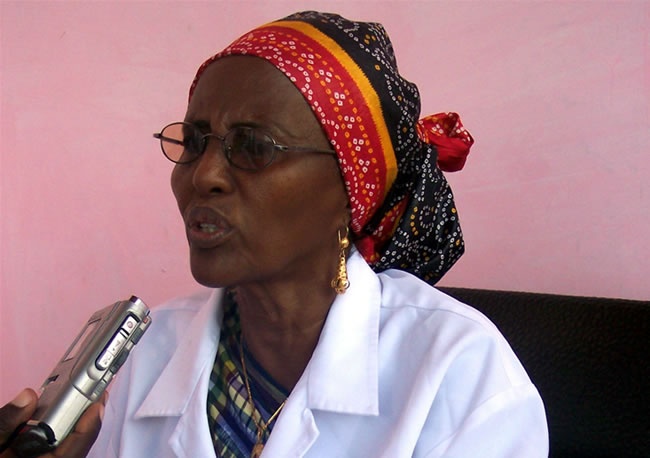Dr. Hawa Abdi died on Aug. 5 in Mogadishu at the age of 73. “Mama Hawa” was a fearless, compassionate humanitarian whose life’s work gave hope to tens of thousands in her native Somalia while inspiring countless others worldwide.
At age 12, she witnessed her mother’s difficult pregnancy and subsequent death during childbirth. Deeply affected by her mother’s suffering, and her own loss, she aspired to become a doctor so that future generations would avoid her own anguish. At the age of 17, she won a scholarship to study medicine in the Soviet Union, returning as one of Somalia’s first gynecologists. While practising medicine, she studied law in her spare time, earning a law degree at 32.
Dr. Abdi’s passion went beyond her studies. In an interview with the journal In-Sight, she recalled the influence of her “wise, calm, strong and intelligent” grandmother, who counselled her to work hard while being forgiving, fair and honest with people. Instilled with these values, she opened a one-room clinic on her family’s land in 1983 to offer free obstetric services to rural women who had no access to health care. She treated about two dozen women every day – until Somalia’s vicious civil war exploded in 1991.
At her grandmother’s behest, Dr. Abdi stayed to help the vulnerable. Soon, thousands of displaced people arrived at her compound seeking refuge. In keeping with the Somali tradition of hospitality, she welcomed all who arrived, offering the best of what she had.
Through her own donations and those provided by Somalis living abroad, the one-room clinic grew to become a 400-bed hospital. Family huts were erected. A primary school was completed, with the goal of instilling a culture of reading. Women were provided with vocational training and nutritional education. Dr. Abdi cultivated hundreds of hectares of her family’s farmland to train people, feed them and sustain the compound under the auspices of the Dr. Hawa Abdi Foundation. She bought a fleet of fishing boats so people could learn how to fish. Part of the daily catch was sold at a local market, and part was used to feed refugees.
In the interim, her two daughters, Amina Mohamed and Deqo Mohamed, followed in their mother’s footsteps, entering the medical profession while staying to help run the foundation.
In 2012, some 90,000 people were housed on Dr. Abdi’s land; over a 35-year period, it is estimated that two million were served by her foundation. She had only two conditions for those seeking entry: Having witnessed the destructive nature of clan divisions, she prohibited the use of clan identification; second, domestic violence was forbidden. Anyone violating either rule was asked to leave.
In 2010, the notorious insurgent group Hizbul Islam invaded the compound, destroying property and holding Dr. Abdi hostage for five days. They demanded she relinquish control of her land, telling her that as a woman, she was not allowed to shoulder any responsibility or authority. She refused and was ready to “die with dignity,” according to her memoir. Hundreds of women in the compound rose up in protest, while condemnations from Somalis poured in, forcing the militants to back down.
Dr. Abdi demanded and received an apology from the insurgent group. In her memoir, she condemned the extremists, saying, “They have clung to a fundamentalist, inaccurate version of Islam to give them a sense of power; as they try to destroy our society, they are also trying to destroy our religion. Now we are hostages to their ungodly belief that a woman is an object, an instrument, to be used only for their purposes.”
As news spread of Dr. Abdi’s courageous humanitarianism, awards followed. In 2010, Glamour Magazine named her and her daughters “Women of the Year.” She was nominated for the Nobel Peace Prize in 2012 and received an honorary doctorate from Harvard University in 2017. The university had to manoeuvre around Donald Trump’s bigoted “Muslim ban” and brought the distinguished humanitarian to Cambridge, Mass., to accept the award. Despite all the accolades, she remained true to her mission, dedicating her life to alleviating poverty and suffering.
In the coming months, mosques worldwide should dedicate Friday sermons to the wondrous example of a contemporary Muslim heroine. She was a genuine leader who personified the Islamic teaching: “A leader is the servant of the people.”
Her life story offers universal lessons in using the twin lights of compassion and hope during periods of darkness. What began as a one-room clinic grew to help a generation of people. Let’s learn from Dr. Abdi’s life as we face the COVID-19 pandemic.
Sheema Khan is the author of Of Hockey and Hijab: Reflections of a Canadian Muslim Woman.
The article first appeared in The Globe & Mail

